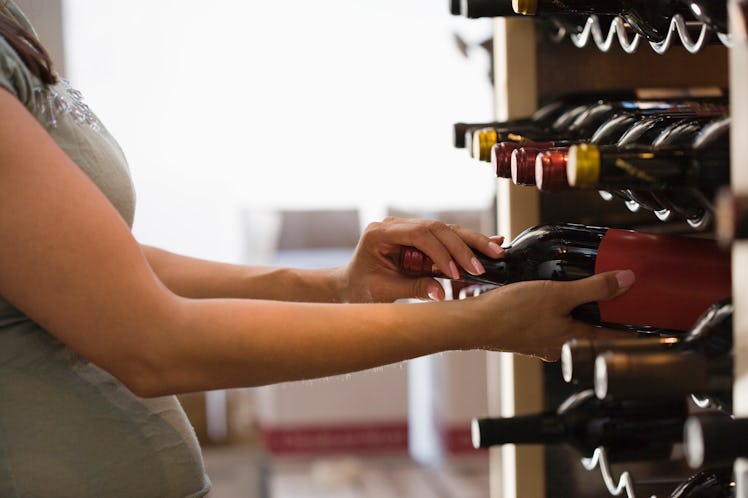Is The Occasional Glass Of Wine During Pregnancy Really So Bad?
Alcohol and pregnancy don't mix, at least not in any great quantity. But what about a moderate amount? The science is...hazy.

It’s common knowledge that drinking any sort of alcohol regularly during pregnancy is ill-advised and potentially harmful for the baby. But when it comes to more moderate consumption, like occasionally drinking wine while pregnant, expectations get blurrier. Can pregnant women drink wine? This question cannot be answered lightly, especially when there is a risk of alcohol passing to the baby via the umbilical cord, potentially causing miscarriage, stillbirth, preterm birth, and any number of lifelong physical, behavioral, and cognitive challenges for the child.
The evidence is abundantly clear that the more alcohol imbibed, the greater the odds of endangering or even losing the baby. Still, these risks don’t stop many expecting parents from wondering: Is a glass of wine here and there really that bad? Drinking wine while pregnant might not seem that bad considering the generations of babies born before we knew about the harmful effects of drinking during pregnancy. After all, back before fetal alcohol syndrome (now called fetal alcohol spectrum disorder) was officially recognized in 1973, pregnant people consumed alcohol without worry. In fact, doctors often suggested they sip wine to relax.
So, Can Pregnant People Drink Wine Or What?
The question of very light and sporadic drinking during pregnancy remains a matter of much debate. The Centers for Disease Control and Prevention (CDC) recommends totally dry pregnancies. It states: “there is no known safe amount of alcohol use during pregnancy or while trying to get pregnant.” The Surgeon General, the American Academy of Pediatrics, and most major medical organizations say basically the same thing — and yes, “dry” means no wine.
But in recent years, there has been mounting skepticism of this blanket booze ban. Some pregnant people feel it’s their right to decide what’s best for their body and baby. And from what they’ve read online or seen other pregnant people do, they just don’t buy that any amount of alcohol is bad. Some obstetricians even suggest abstinence with a wink and a nod, having delivered hundreds or even thousands of healthy newborns, some of whose mothers enjoyed wine while pregnant.
Those who scoff at the idea that pregnancy must be completely dry aren’t pulling their beliefs out of thin air. There is, in fact, some decent science suggesting that light or even moderate alcohol consumption may not be as detrimental as it’s made out to be. For example, a 2013 study of nearly 7,000 ten-year-olds showed no evidence of adverse effects among the kids whose mothers drank moderately while pregnant (seven or fewer drinks per week).
Another study, published in 2010, followed newborns until age 14 to see how many displayed behavioral problems based on their mothers’ drinking habits while pregnant. As it turned out, until about age five, there was no meaningful difference between the children of teetotalers and those of even moderate drinkers. From that point onward, behavioral problems across groups declined uniformly.
How Do You Study the Impact of Drinking Wine While Pregnant? Poorly.
There are a handful of other studies out there that could convince a pregnant person it’s okay to pop the cork — so long as it’s only once in a while. But here’s the thing: Studies like these have flaws. Depending on how they’re designed and analyzed, they don’t always paint an accurate picture of risks.
For one thing, some researchers rely on women to volunteer whether or not they drank alcohol while pregnant, as well as how much and how often. Self-reporting is a notoriously unreliable method of collecting accurate data, whether it’s a study of exercise habits, food choices, or how frequently people have sex. So, when it comes to something as taboo as drinking alcohol while pregnant, it’s almost guaranteed that some study participants won’t be forthcoming about their drinking.
Here’s another problem: There is pretty much no way to conduct a randomized, placebo-controlled trial, which is the gold-standard model for producing accurate evidence. It would be straight-up unethical (likely illegal, too) for a researcher to give some pregnant people alcohol, keep others sober, and watch to see what happened with their babies.
And even if a study doesn’t find a statistically significant increase in risks due to light or moderate alcohol consumption, that doesn’t mean the risks are zero. The CDC and other medical groups use this logic when advocating for total sobriety.
What all of this means is there really is no sufficient way to know for sure that light to moderate drinking during pregnancy is safe. It might even be probably safe — and for some pregnant people, that might be good enough. But at this point, it’s impossible to say there are no risks to sipping a few beers, cocktails, or glasses of wine while expecting.
This article was originally published on